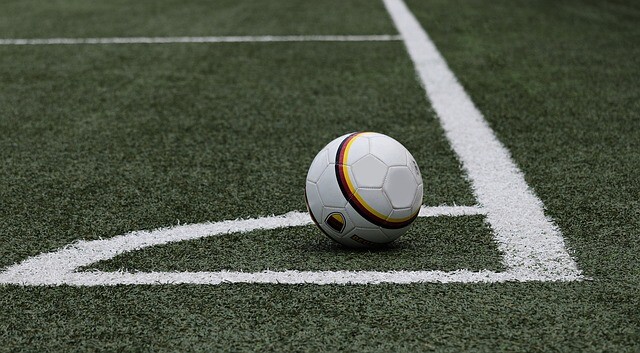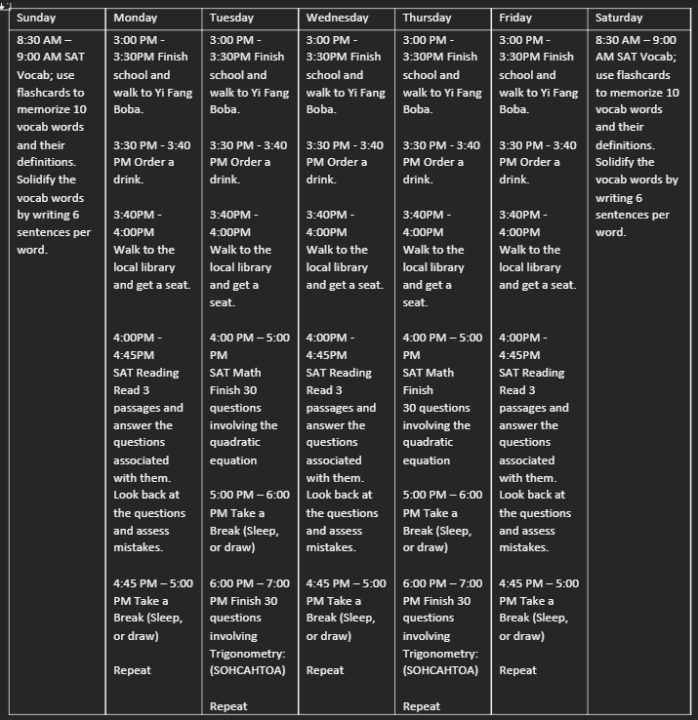Before we actually cover how to increase your SAT score by 300 points, it’s absolutely crucial that you understand the nature of online SAT guides. We’re going to get right to the point.
Most online SAT guides DO NOT WORK.
Now, why is that?
Most online SAT guides don’t work because they tell you things that you already know but can’t take actionable steps towards. This means the advice they give is obvious. But, there’s no “how”.
Here’s an example.
Top 5 ways to increase your SAT score
- Use the Princeton Review or other online resources
- Use a study schedule
- Practice with practice tests
- Adopt better study habits
- Don’t be lazy
Does this list actually tell you anything new that you need to know?
Uhh, no.
Not only that, it doesn’t actually give you actionable steps. “Don’t be lazy” isn’t really a command. It’s an abstract goal with a web of connections. In order to not be lazy, you have to overcome the fear of failure, condition yourself to avoid instant gratification, and organize your schedule. But, even those need actual steps.
Opening the assignment and doing 5 questions every day regardless of the fear is an actionable step.
Delaying gratification by having at least one bland meal a day for a week is an actionable step toward the right path.
Just “don’t be lazy, bro” is not a plan with actual steps to take.
So, with that out of the way, we want to give you ACTUAL advice on how to increase your SAT score by 300 points. This formula is a bit… long. So, make sure to get your pen and paper out and start writing notes. You’ll need it!
Table of Contents
- Why You (Probably) Can’t Improve By 300 Points Without a (Proper) Coach.
- Using the Right Materials.
- Making Your “Game Plan”.
- How to Study for the SAT When You REALLY Don’t Want To.
- Organizing Where Your SAT Mistakes Are in a Comprehensive List.
Professional College Application Help.
Contact us. We'll get to you within 24 hours.
Why You (Probably) Can’t Improve By 300 Points Without a (Proper) Coach.

This is the longstanding question: should I get an SAT tutor or coach? Or, should I just self-study?
Here’s the answer. You’ll most probably need a coach. Now, the question is: why is that?
We highly recommend having an SAT coach because most regular students are not capable of performing or improving on the SAT on their own. That’s because the SAT was not designed to be improved upon with multiple takes. It’s meant to be an IQ test.
Okay, we know what you’re thinking: “But, PenningPapers, the SATs are not correlated with IQ or intellectual aptitude!”
This is a common misconception. And, for reasons unknown, both educational consultants and teachers alike seem profoundly averse to accepting the SATs (and ACTs for that matter) as correlating with intelligence.
“Although the principal finding of Frey and Detterman has been established for 15 years, it bears repeating: the SAT is a good measure of intelligence [1]. Despite scientific consensus around that statement, some are remarkably resistant to accept the evidence of such an assertion. In the wake of a recent college admissions cheating scandal, Shapiro and Goldstein reported, in a piece for the New York Times, “The SAT and ACT are not aptitude or IQ tests” [6]. While perhaps this should not be alarming, as the authors are not experts in the field, the publication reached more than one million subscribers in the digital edition (the article also appeared on page A14 in the print edition, reaching hundreds of thousands more). And it is false, not a matter of opinion, but rather directly contradicted by evidence.”
Section 2.1, “The SAT Measures Intelligence”: Frey, M. C. (2019). What We Know, Are Still Getting Wrong, and Have Yet to Learn about the Relationships among the SAT, Intelligence and Achievement. Journal of Intelligence, 7(4). https://doi.org/10.3390/jintelligence7040026
In fact, the SATs have a correlation with general intelligence anywhere between .5 to .9. That doesn’t sound like much; but, that kind of correlation almost never exists in social sciences.
They’re IQ tests for fluid intelligence –which are not supposed to change.
Trying to study for the SAT on your own and hoping to improve is like measuring your height at the doctor’s office. After a certain age, your body simply does not grow anymore. Nonetheless, college admissions consulting and tutoring companies will insist that the SATs and ACTs have no correlation with intelligence. This is because insisting otherwise would imply most tutoring is useless.
And, well, that’s right. Most SAT and ACT tutoring is useless and doesn’t increase test scores. So… how do we explain those students who DO in fact increase their scores?
Those students have conditioned themselves to adapt to the standardized testing format. They trained their minds to perform during fluid intelligence tests.
Let’s use height as an analogy again. Instead of trying to grow from 5’4 to 5’6, you put high hells to “become taller”. You’re not actually taller. But, you still look 5’6 tall instead of 5’4.

This is the same principle. If you really want to increase your SAT score by 300 points, you should not try to increase your IQ. That’s impossible, just like how increasing your height is impossible. Instead, you want to condition yourself to perform better at fluid intelligence tests. That’s like putting on high heels.
The score may come out as 300 points higher; but, your fluid intelligence mostly stays the same.
You can do this alone. Or, you can get a tutor. But, even then, it’s quite difficult to study for. That’s why having a specialized and proper coach who knows how to help condition your mind for the SATs is vital. They’re the ones who can put you in high heels.
Okay, yeah. We know. Weird analogy. But, you get the point!
So, to recap.
You’re not meant to improve on the SAT because it’s a measurement of fluid intelligence: an unchanging variable. That’s why you may notice that your SAT score only changes by a few points every time you take it despite how much you study. If you’re going to ACTUALLY study for the SAT, you need to know how to play the game right. That means gaming the fluid intelligence test by conditioning your brain to answer SAT-formatted questions.
This is exactly what our SAT coaches here at PenningPapers do, and it’s exactly what you should be looking for in a coach or tutor who is worth their salt.
Of course, if you’re looking for reliable coaching that will actually help you improve your SAT score by 300 points, consider speaking with us! We’ll get back to you in 24 hours with a specialist who best suits your learning needs, and increases your score in the least amount of time!
Using the Right Materials.

The next step for increasing your SAT score by 300 points is to use the right materials.
To be fair, this is actually not too hard. There’s no secret sauce that goes into having the right SAT test prep materials, and that goes the same way for the ACT.
For the most part, you only need two things.
- The SAT list of principles and topics
- SAT practice books. (example: Barron’s, The Princeton Review, College Board)
The list of principles and topics means the category of questions you get.
So, for example, the SAT Writing section requires you to know a certain level of grammar. Within the grammar umbrella, you’re expected to know…
- Independent clauses
- Commas
- Semicolons
- Gerunds
- Parallelism
… and many more.
Having a list of all the principles and topics will help you master each set of possible SAT questions. It’ll also help you organize the kinds of questions you need to study in a neat and tidy list. You can rank order the kinds of SAT question categories you need to study from most to least important as well.
This makes a massive difference, especially since many students study for the SATs without organizing the questions by category. They just give themselves random questions.
Here’s an example of what a list would look like.

We pulled this from one of our students; so, that’s why you see the fancy designs and hearts.
Don’t worry. Hearts aren’t required.
Making Your “Game Plan”.

The next step is making your game plan.
A game plan is exactly what you’d expect. It’s an organized plan of actionable steps you need to take before your scheduled SAT test date. It details everything you need to do from the number of minutes and hours you need to study to the kinds of subjects you’ll study.
If you really want to increase your SAT score by 300 points, you have to be serious about fleshing out this game plan. There are two rules to setting up a game plan.
- It needs to be SPECIFIC, SPECIFIC, SPECIFIC.
- It needs to train you to do WHAT YOU TELL YOURSELF TO DO. It is NOT there to find the MOST PRODUCTIVE WAY TO STUDY FOR THE SAT.
Let’s start with the first point.
When setting up your SAT game plan, you’ll need to specify each detail of how you’ll prepare for the test. Here’s an example. Let’s say you need to take your SAT in 1 week. You have 1 week to prepare (which is quite short.)
You’ll need to set up a proper schedule that has actionable steps toward studying. Remember: be specific.
Here’s an example:

This is, of course, a very brief game plan spanning just one week.
If you have your SAT test scheduled in one month, you’d make a game plan spanning one month. 1 and a half months, and you’d have one for 1.5 months.
One of the things you’ll notice about this game plan is that it’s specific down to the micro level. It gives very clear instructions on when to take breaks, and how many questions to answer. But… why? Why not just keep studying until you can’t anymore. That would be much better, right?
Well, not really. This is where we get to the next point: training the mind to do what you tell it to do.
If you let your schedule go crazy, and you don’t follow the scheduled activities you assigned yourself, you’ll establish a routine where “what you do doesn’t hold weight.” So, what does this mean?
It means that every time you tell yourself to do something, your self-commands have no power.
Let’s say on Tuesday you assign yourself the task to do 30 Math questions.
You MUST do just 30 math questions. Nothing more and nothing less. The moment you do less, well, it’s obvious why that’s no good. But, the moment you do more, you’ve just broken the rules that you yourself assigned.
This is bad because it conditions your mind to be lax and loose with the rules you set yourself. Instead, you need to be specific with your game plan and stick to doing only what you’ve written in the schedule. This will help condition the mind toward the right path. It’ll teach your brain that you need to do what you tell yourself to do such that, when you really don’t want to study, you will have an easier time executing tasks.
The more you break the rules you set yourself in the game plan, the more normal it becomes to break your own rules as a whole.
How to Study for the SAT When You REALLY Don’t Want To.

This step can sound a bit complicated.
It takes some practice; but, be patient with it! We teach this to our students here at PenningPapers. And, you can roughly replicate it at home.
The best way to study for the SAT is to use what we call the “Free Prison” method. Don’t worry, it’s not as brutalizing and scary as it sounds.
Avoid Dopimanergic Activities Using a “Free Prison” Method

Before we get to this method, let’s make some things clear. No, this is not going to involve an actual prison. No, this is not a personal torture method.
Instead, this is a meditative practice that helps condition you to become accustomed to doing boring things. It WON’T make the SAT fun. But, you’ll find studying and practicing for it bearable!
With that out of the way, let’s get right to it.
The Free Prison method only involves a few rules.
- You can technically do any of the following 3 things.
- Study/Practice for the SAT
- Eat
- Sleep
- Rest/ Go for a Walk
- You cannot use dopaminergic things that are highly stimulating such as video games or social media.
- You cannot do “other productive stuff” such as cleaning your room or finishing chores.
Those last 2 rules are very weird. But, we’re going to get to those in a bit. We promise this makes sense. First, let’s cover the first rule.
The Free Prison method gives you the “freedom” to do anything you want so long as it falls under the four bullet points we listed above. This means you have the freedom to not do work, and you can stop your work at any time.
If you “don’t feel like studying”, the rule is not to force yourself to work. It’s not a slave/master relationship.
Instead, let yourself take a break.
Go for a walk. See some trees. Eat some food. Or, even just take a nap.
The key here is that it gives you some freedom to breathe and take space away from your work if you need to. Then, whenever you’ve slept enough, eaten enough, or exercised enough, you can get back to your work.
Now, this is where it gets tricky!
The next rule is, you can’t do stimulating things. This is because your mind WILL make excuses to make you go on your phone or play video games. The rule here is solid. You can’t go on your phone or do any other stimulating things that lead to instant gratification. Then, the longer you don’t go on your phone, the more your mind will make excuses.
Here are some examples of excuses the mind will come up with.
- “Nooo! You need to check your Facebook because you should keep everyone updated!”
- “Nooo! You need to watch YouTube and watch Tik Tok because you’ve worked so hard and deserve a break!”
- “You go, girl! Treat yourself! You deserve it!”
Notice that the mind will keep coming up with these excuses, and it will be conditioned to make up random crap to justify an excuse for a dopaminergic hit! It’s going to be tempting. Especially because it will sound correct. Don’t give in. If you need a break, go for a walk. If you’re tired, sleep. If you’re bored, go make something to eat.
Once you limit your mind to these things, your brain will naturally coalesce back into work once more.
So… what about cleaning the house or doing the dishes?
Well, there are instances when the house needs cleaning or the dishes need doing. But, if your mind is straying away from work, ask yourself this: is cleaning your house or doing the dishes part of your schedule?
If you scheduled yourself to clean the house beforehand, then hey: that’s fine!
However, if you never scheduled yourself to do the dishes and you just now have the impulse to do so, it’s most probably your emotional mind looking for an out away from the work you know you need to do.
Do you ever notice how, before you have a long essay due, you seem to clean your room, do the dishes, and all the other crap you know is not related to the main task at hand? Do you ever notice you can’t do the thing you need to do and end up only completing the “side quests” in life?
This is why: the mind keeps coming up with excuses to get away with avoiding the pain of the given task.
So, again, follow the Free Prison method. If it doesn’t involve working on the SAT, eating, sleeping, or resting, you shouldn’t do it. This method will condition your mind to avoid making excuses and will help you do what you tell yourself to do.
Organizing Where Your SAT Mistakes Are in a Comprehensive List.

One of the biggest mistakes people make when trying to improve their SAT score is not looking deep enough at the questions they got wrong.
If you want to increase your SAT score by 300 points fast, the best way is to be very organized with the questions you make mistakes on. Specifically, you need to do this.
- Take a few practice tests.
- Record all the questions you got wrong.
- Put them in an excel sheet or a word document.
- Locate what class of question the mistake was in. For instance, was it an SAT writing question? If so, what kind of SAT writing rules were involved? Subject Verb agreement? Independent clauses?
- Categorize the kinds of mistakes you have from most to least common. So, if you make the most semicolon-related mistakes, put that at the top of your list. If you make only a few mistakes with probability in the Math section, put that at the bottom of your list.
The reason you need to do this is that it helps you visualize how much work you need to do.
If you don’t organize where you made mistakes and the category of questions you struggle with, it will be hard to improve your SAT score by 300 points without getting lost. You won’t have a narrow aim in terms of the class of questions you need to study.
Instead, you’ll end up just carelessly studying without really targeting the questions in an organized manner. When the mind needs to practice multiple classes of problems, it won’t remember or retain anything it learns.
So, be sure to organize your mistakes by category and target them one by one.
We hope this guide helps. It’s not easy to know how to increase your SAT score by 300 points. In addition, even the people who know seldom have the motivation to truly practice and improve their scores. We know: it’s hard. But, it doesn’t have to be hopeless, though!
If you aren’t certain you can increase your SAT score by 300 points, you should consider speaking with our SAT coaching experts. We’ll respond to you within 24 hours. We’ve also helped people skyrocket their test scores from the low 1000s to anywhere between 1400-1600.

